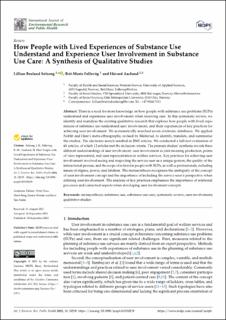How People with Lived Experiences of Substance Use Understand and Experience User Involvement in Substance Use Care: A Synthesis of Qualitative Studies
Peer reviewed, Journal article
Published version
Permanent lenke
https://hdl.handle.net/11250/2834446Utgivelsesdato
2021-09-28Metadata
Vis full innførselSamlinger
- Publikasjoner fra Cristin [3269]
- SAM - Institutt for sosialfag [471]
Originalversjon
https://doi.org/10.3390/ijerph181910219Sammendrag
There is a need for more knowledge on how people with substance use problems (SUPs) understand and experience user involvement when receiving care. In this systematic review, we identify and reanalyse the existing qualitative research that explores how people with lived experiences of substance use understand user involvement, and their experiences of key practices for achieving user involvement. We systematically searched seven electronic databases. We applied Noblit and Hare’s meta-ethnography, revised by Malterud, to identify, translate, and summarise the studies. The electronic search resulted in 2065 articles. We conducted a full-text evaluation of 63 articles, of which 12 articles met the inclusion criteria. The primary studies’ synthesis reveals three different understandings of user involvement: user involvement as joint meaning production, points of view represented, and user representation in welfare services. Key practices for achieving user involvement involved seeing and respecting the service user as a unique person, the quality of the interactional process, and the scope of action for people with SUPs, as well as professionals, including issues of stigma, power, and fatalism. The metasynthesis recognises the ambiguity of the concept of user involvement concept and the importance of including the service user’s perspective when defining user involvement. The analysis of key practices emphasises the importance of relational processes and contextual aspects when developing user involvement concepts.

